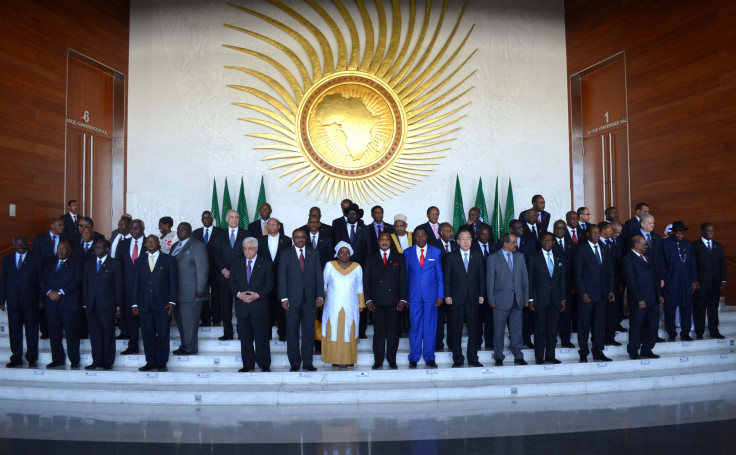Time For The African Union To Focus On What It Can Fix: International Trade

This weekend, in the Ethiopian capital city of Addis Ababa, African leaders from all across the continent are at risk of letting a massive opportunity pass them by.
Top officials are gathering for the 21st summit of the African Union, or AU. The sessions for the Parliament Representatives Committee and the AU Executive Council have come and gone, leaving the the AU Assembly for Heads of State and Government as the main event for this weekend.
Saturday is slated for 50th anniversary celebrations. It was on May 25, 1963, that the AU’s predecessor organization, the Organization of African Unity, or OAU, was first established.
The OAU was formed to unite African interests in an era of new independence as the regime of colonialism fell apart. The AU, which replaced the OAU in 2002, has a more modern mission: to promote “an integrated, prosperous and peaceful Africa, driven by its own citizens and representing a dynamic force in a global arena.”
But the AU is often censured for being slow, ineffectual and inefficient -- good at making decisions, but lackadaisical when it comes to implementation. That criticism is valid, though it should also be noted that the AU’s challenges are great. The organization faces the daunting task of uniting leaders from 54 vastly different countries, and funding for big programs isn’t always easy to come by.
But there is one sphere where the AU could make a lasting difference: intra-continental trade.
With all of its abundant resources, Africa has much of what it needs to fuel growth across borders. It can be as simple as exchanging resources; some countries lack a suitable environment for agriculture, while others are brimming with rainfall and lush soil. Some communities have become hubs for technology innovation, while others have abundant capacity to provide both labor for manufacturing and markets for consumption. Opening borders can also facilitate the exchange of information and expertise regarding everything from government policies to environmental preservation to business growth.
Over the past 50 years, Africa has come a long way. The continent is still known for high rates of poverty and underdevelopment, but the IMF reported last month that economic growth in sub-Saharan Africa will hit 6.1 percent in 2014, far better than the global average of 4 percent. Middle classes are expanding, hubs of entrepreneurship are flourishing, and poverty rates have been on the decline since the 1990s.
That means now is the perfect time for policies that take domestic growth and put it to use in an international sphere -- but progress on that front has been sorely lacking. Protectionist or myopic regulations have put a damper on cross-border exchanges for decades.
A World Bank Report drew special attention to the problem last year.
"While there has been some success in removing import duties within regional communities, a range of non-tariff and regulatory barriers still raise transaction costs and limit the movement of goods, services, people and capital across borders. The end result is that Africa has integrated with the rest of the world faster than with itself."
The solutions here are pretty straightforward. The World Bank’s recommendations include setting up systems to ease the flow of information, simplifying border passage requirements, removing import and export taxes and reforming regulations and immigration rules.
A great many African leaders have already made great efforts to implement these sorts of changes. Even the AU has focused on this issue; the theme of its 19th summit in 2012 was “Boosting Intra-African Trade.” The African Economic Community, established in 1991, continues to pursue its goal of uniting various regions across the continent, and myriad initiatives and free trade agreements have been put forth on continental, regional and domestic levels.
But there is still a long, long way to go. As it stands, intra-continental trade accounts for a miniscule 10 percent of African countries’ total international trade.
Changing this would not be a panacea for Africa’s problems -- far from it. But as far as the AU is concerned, this is one arena where summits can have a real impact. The policy changes wouldn’t be without cost, but compared to other objectives like security and development, they could be done without too much assistance from outside donors or authorities.
If the AU is to become more effective and efficient, it needs to focus those issues that it has the most power to address. International trade is a big one, and progress in that sphere would have spillover effects into various others.
A blog post this month from the Brookings Institute hits the nail on the head:
"Increasing intra-African trade, building an African consumer base, and networking African interdependence may offer great long-term promise. These are all steps toward the same goal of a prosperous and peaceful Africa. While the AU does not have the authority to overcome poor capacity, a lack of political will, or other challenges that African countries and RECs may face or bring to the table, it can and should better follow its mission in encouraging integration."
Africa’s rising tides consistently fail to lift all boats, and opening lanes of access between growing economies is the most straightforward way to address that. But half a century has passed since the Africa’s most influential dignitaries first gathered to forge a common continental identity, and a solution is long overdue.
© Copyright IBTimes 2024. All rights reserved.








